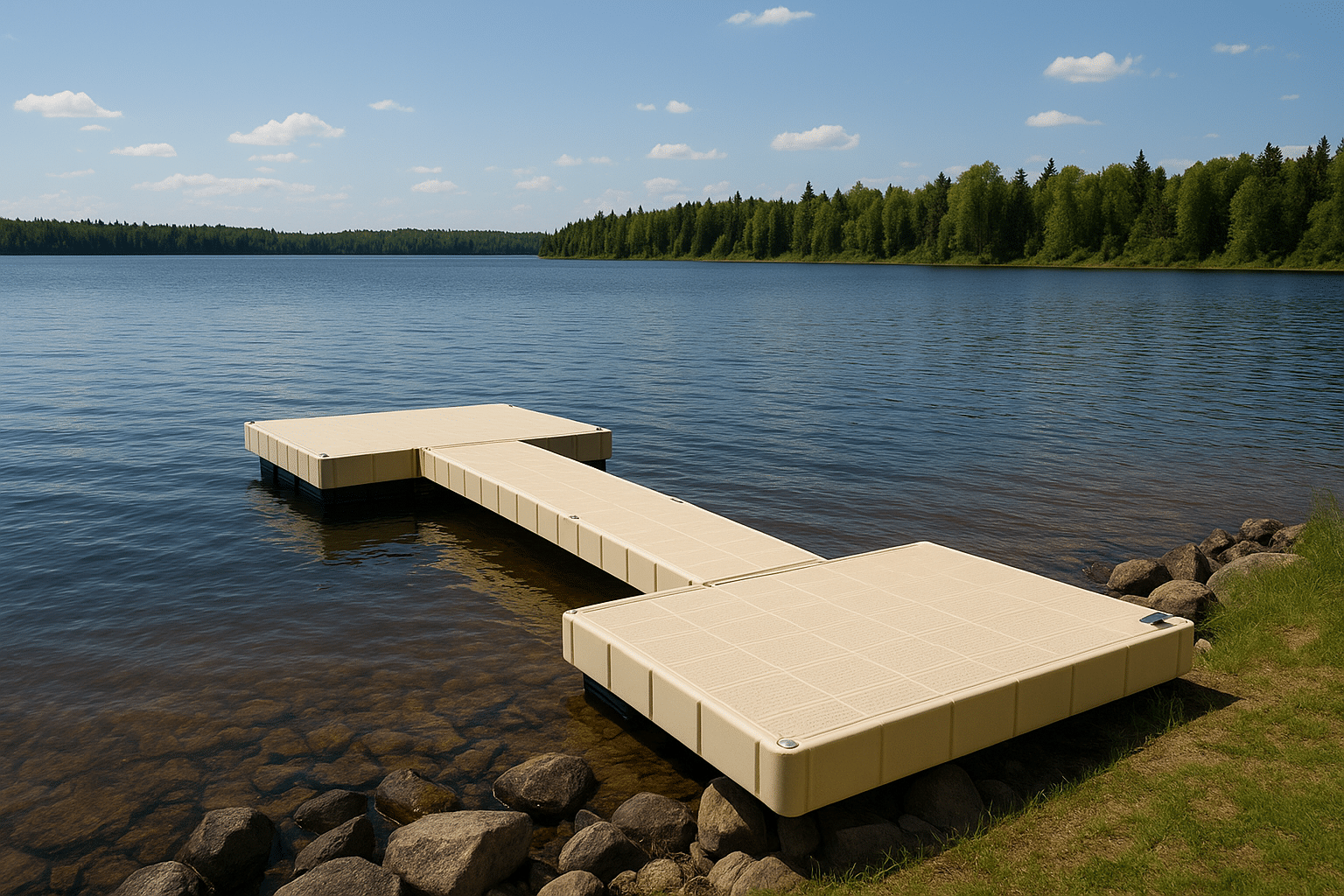Floating docks are a smart, flexible solution for lakefront properties across Canada. But not all docks are created equal. Whether you’re on Lake of the Woods in Northwest Ontario or enjoying weekends in Whiteshell Provincial Park, choosing the right floating dock depends on your location, water conditions, and how you plan to use it.
Understand Your Water Conditions
Before anything else, take a close look at your shoreline and the body of water your dock will sit in. Is the lakebed rocky, muddy, or sandy? Is the water level stable or does it fluctuate through the seasons?
Floating docks are ideal for areas with changing water levels, which are common in parts of Saskatchewan and Manitoba. Because they rise and fall with the water, you don’t have to worry about adjusting them manually. If your lake experiences freezing temperatures, check how thick the ice gets in winter. A removable or ice-resistant dock will help prevent damage during freeze-up.
Consider the Dock’s Primary Use
What will you be using your dock for most?
-
Swimming and lounging? Choose a layout with a large platform area and soft edges.
-
Boating? Opt for a dock that includes cleats or space for PWC ports and boat mooring.
-
Fishing? A T-shaped or L-shaped dock gives you more room to move, cast, and set up gear.
Think about who’s using the dock, too. If you’ve got kids or older adults visiting the cottage, you’ll want a dock with slip-resistant surfaces and stability.
Know the Local Regulations
Canada’s provinces and local municipalities often have specific regulations around docks—especially in protected parks or near conservation areas. Before installing a new system, check with your local authority or provincial park office. Some areas require permits or only allow specific materials.
If you’re located in Kenora, Regina Beach, or Thunder Bay, contacting your local dock service provider is a smart move—they often know the ins and outs of these regional rules.
Pick the Right Materials
Floating docks come in a few common material options:
-
Plastic/Polyethylene: These are durable, low-maintenance, and ideal for Canadian winters. They’re also lightweight and modular, making them easier to install and remove.
-
Aluminum: Strong and rust-resistant, aluminum docks handle heavy use well but can cost more.
-
Wood: Traditional, natural-looking, but requires regular upkeep and can degrade faster in wet, cold climates.
In places like Duck Mountain or Lac La Ronge, where the environment can be harsh, plastic floating docks tend to offer the best mix of longevity and performance.
Think About Add-ons and Flexibility
Do you plan to expand your dock later? Maybe add a kayak launch or dock ladder? Modular floating docks make that easy. Many systems come with built-in accessories or compatible add-ons.
Planning ahead saves money down the road and gives your dock long-term versatility. Whether you’re adding space for more watercraft or want to create a floating dockside lounge, it pays to invest in a flexible system.
Factor in Winter and Ice Concerns
Let’s not forget the Canadian winters. In cold climates, ice pressure can do major damage to docks. Some floating docks are designed to resist ice damage and can stay in the water year-round. Others are better off being removed each fall.
If you’re in regions like Clearwater Lake or Fort Frances, you may need a removable dock system. Check with your dock dealer about seasonal solutions and storage options.
Cost vs. Longevity
Finally, think long-term. The cheapest dock might not last, especially in tough Canadian weather. Paying a bit more upfront for a quality system could save you the cost—and hassle—of repairs or replacements later.
Make sure you’re not just choosing based on price. Balance the upfront cost with maintenance, durability, and the ability to expand or relocate the dock in the future.
Conclusion: Invest in the Right Dock for Your Life by the Lake
Choosing the right floating dock isn’t about picking the most expensive model—it’s about finding the system that fits your lifestyle, your lake, and your long-term plans. Whether you’re spending weekends in Quetico or living full-time on the water in Petersfield, the right dock enhances every moment on the lake.
To explore your options or get expert advice tailored to your area, reach out to the team at Nor Col Docks. Visit norcoldocks.com/contact or connect with them on Facebook at facebook.com/NorColEZDock for personalized recommendations that make dock life better.







